Make sure the coffee is ready, hot and with extra brewing. Its not known if Voltaire preferred cream and sugar or straight up black, however it has been documented that the philosopher and part-time scallywag and ringtail drank copious amounts varying from fifty to seventy cups “par jour.” Then, there is a probability, some conjecture that he had to relieve himself on multiple occasions in the wee hours.
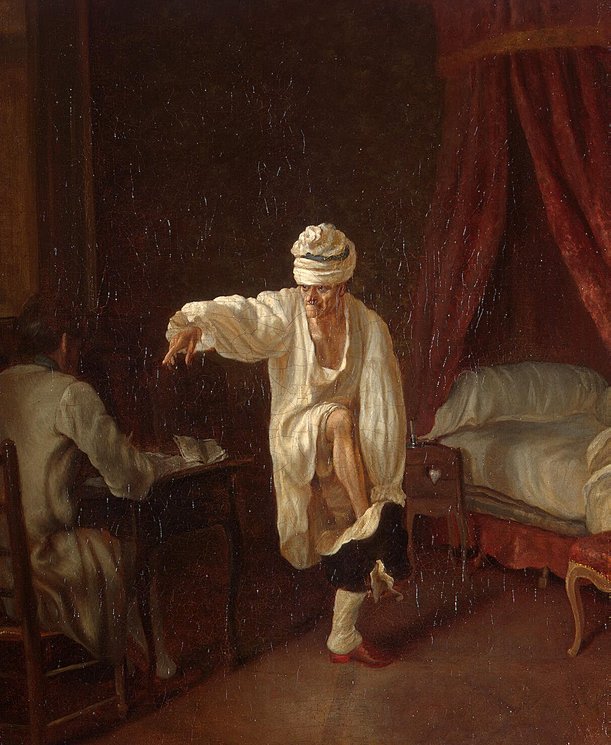
Voltaire's Morning. Jean Huber. Read More:http://www.arthermitage.org/Jean-Huber/Voltaire-s-Morning.html
Eccentric, he was. In Jean Huber’s morning portrait, Voltaire is shown trying to capture the fresh thoughts of the morning. Virgin ideas unviolated by his own emotional disregard. He jumps into his breeches, dictating all the time to his secretary, who is scribbling at a table near the bed. The early bird gets the worm; the catch of phrase and the first taste of vocabulary. The portrait does recall Jean Genet, and his assertion that he wrote, “for the taste of words, even for the taste of the commas of punctuation, for the taste of the sentence.”
…He professes a great regard for the Late Lord Chesterfield & for this Lord of Course so that we can force ourselves upon him at most times; Some time ago after repeated excuses to avoid being seen by a person that wanted to be introduced to him he Answered at last. Si je suis en Vie je serai a vos Ordres, Si je suis mort je vous en demande pardon d’avance. & Pauvre Diable de Ferney. Hubert ….has lately made a picture of him come out of bed stand[ing] leg & putting on his breeches dictating to his a very fair Specimen of his Way. … People have a notion that there is something now in agitation between him & the King of Prussia. The latter has had an Officer residing at Voltaires above eigth Months & the most
probable conjecture is that this officer has brought Memoires of the late Wars to be licked up & waits to carry them back again.” Read More:http://www.europeanjournal.it/ferguson_french_enlightenment_switzerland_voltaire.pdfa
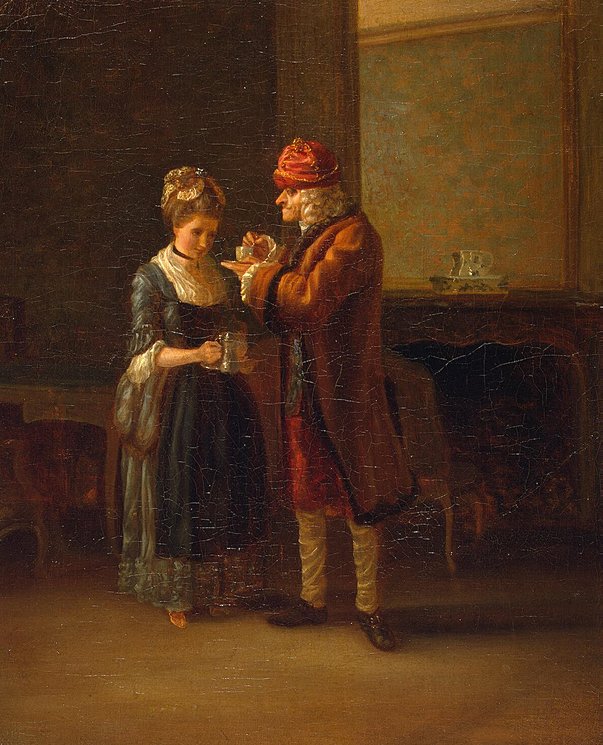
---Voltaire, who drank copious amounts of coffee throughout his life, was once warned that the beverage was a slow poison. "It must be slow," the philosopher replied, "for I have been drinking it for sixty-five years and I am not yet dead."--- Read More:http://www.arthermitage.org/Jean-Huber/Voltaire-s-Breakfast.html
In the above painting by Huber, Voltaire is taking coffee poured by his favorite servant- the men were commonly referred to as lackeys- Agatha, to whom he says each morning as ritual, ” lovely Agatha, you charm all eyes,” on which Agatha blushes, and bows her head in modesty.
ADDENDUM:
A lot happened the year they met. Emilie and Voltaire had a great relation, but he was a hypochondriac, and oh could he kvetch. When he started going on about his health – and he found out that, as he put it, his little machine wasn’t working properly – she pretty much left him, and took up with a dishy pirate’s son (who was also a top mathematician). The pirate’s son was named maupertuis. After a few months voltaire felt better.
… If Emilie had met Maupertuis at any other time in her life, she might have easily decided to stay with him. But by February 1734, Voltaire was feeling better, and started his counterattack. He knew that Maupertuis was brighter and a better scientist than him, but he wrote a poem for Emilie to still try to get her back…
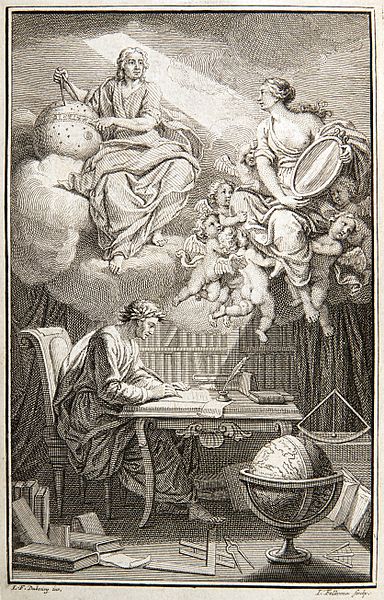
---In the frontispiece to Voltaire's interpretation of Isaac Newton's work, Elémens de la philosophie de Neuton (1738), the philosophe sits translating the inspired work of Newton. Voltaire's manuscript is illuminated by seemingly divine light coming from Newton himself, reflected down to Voltaire by a muse, representing Voltaire's lover Émilie du Châtelet—who actually translated Newton and collaborated with Voltaire to make sense of Newton's work.--- Read More:http://en.wikipedia.org/wiki/File:Voltaire_Philosophy_of_Newton_frontispiece.jpg
…Yet did Voltaire really understand her better? She wasn’t sure. By late February she was seeing both men – Voltaire’s little ma
e was pretty much in order – but that couldn’t go on forever (and then I describe her decision…) Many many chapters later, after she and Voltaire had pretty much broken up (or seemed to), he wrote her, explaining that he was too old to have sex. (it wasn’t quite true, for he was having an affair with someone else by then; …
Then, a few years after her main problems with voltaire, in 1748 she met a handsome young poet named st. Lambert. She was around 42; he was 27. In the court where they met they couldn’t be seen speaking to each other at first, and so they left notes for each other in a harp that was in the main hall. It was only used for occasional concerts, but it was so attractive that it was fine for visitors to pause in front of it, as if examining the woodwork or strings. That’s where she and st. Lambert left their first notes. Read More:http://www.davidbodanis.com/pages/passionate_minds_pg.html
————————————-
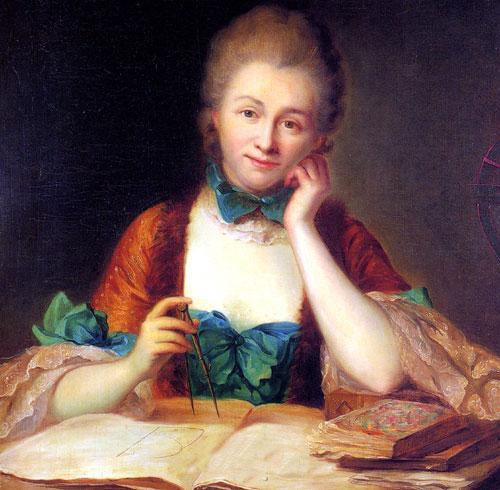
---Émilie du Châtelet was a mathematician and physicist who lived in France in the Age of Enlightenment. She predicted that the spectrum of light extended past the visible and proposed an experiment to prove it. She reviewed the available evidence (mathematical and experimental) on kinetic energy and proved correctly that the energy of a moving body is proportional to the square of its velocity (not the velocity, as Newton proposed).---Read More:http://penguinunearthed.wordpress.com/2011/07/19/travelling-feminist-emilie-du-chatelet/
In France, meanwhile, Voltaire was reputedly downing between 50 and 72 cups of coffee a day, a habit that many link to the brevity and mania of Candide.
None of this mental activity much pleased the powers-that-be, who viewed coffee drinkers as a threat. Unlike alcohol, which merely caused buffoons to pound on each other and pass out in the gutters, coffee seemed to foment true anti-establishment behavior among the intelligentsia. England’s King Charles II went so far as to issue a proclamation banning coffee houses, though popular uproar forced him to quickly rescind the order. And his Prussian peer, King Frederick, urged his subjects to drink more beer instead of coffee, though he wasn’t entirely motivated by a desire to suppress dissent–he also wanted to keep the nation’s money out of the hands of English and French coffee merchants.Read More:http://www.washingtonmonthly.com/features/2005/0506.koerner.html
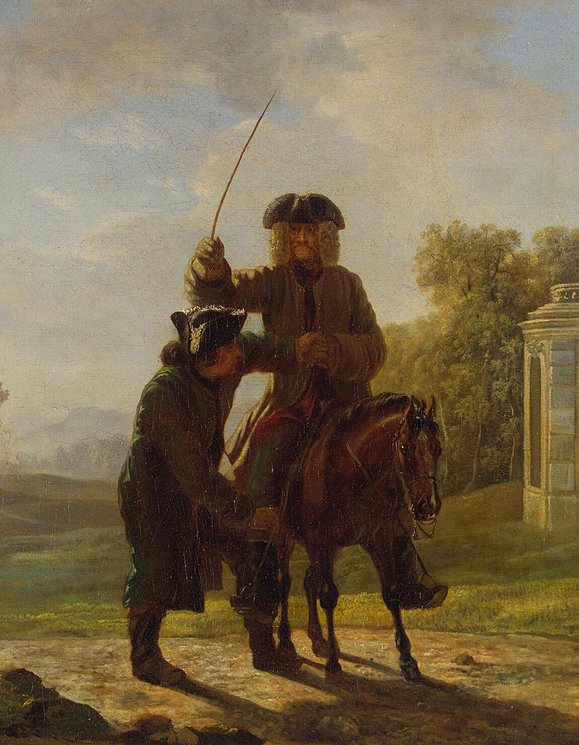
Voltaire Riding a Horse. Jean Huber. Read More:http://www.arthermitage.org/Jean-Huber/Voltaire-Riding-a-Horse.html
——————————
Lord Chesterfield:”Voltaire recited to me last year at Brussells some passages from his Mahomet, in which I observed some very beautiful poetry, and some ideas more brilliant than true, but I saw at once that he intended to represent Jesus Christ under the character of Mahomet, and I was surprised that no one had perceived this at Lille, where it had been represented just before I was there. I even found at Lille a good Catholic, whose zeal surpassed his penetration, who was extremely edified by the way in which this impostor and enemy of Christianity was depicted. .
“With Voltaire, it is not a question of his subject, but of bold, brilliant and unusual ideas which he wishes to give to the public. no matter where or how .
but what I cannot pardon. and which is unpardonable, is all the suggestions which he gives for the propagaticn of a doctrine as pernicious to civil society as it is contrary to the religion general in all countries.
“I very much doubt if it is allowable for a man to write against the religious observance and the belief of his country, even if he were truly persuaded that there were errors which might cause trouble and disorder; but I am quite sure that it is never allowable for him to attack the foundations of morality, and to break those bonds so necessary, and already too feeble to keep men in the path of duty.” The contemporary opinion also of Dr.
Johnson, a very religious man, is perhaps worth quoting, in its characteristic violence.
Johnson : ” Rousseau, Sir, is a very bad man.” Boswell : ” Sir, do you think him as bad a man as Voltaire?” Johnson: ” Why, Sir, it is difficult to settle the proportion of iniquity between them.” Read More:http://archive.catholicherald.co.uk/article/16th-september-1938/6/this-controversy-recalls-lord-chesterfields-view








 COMMENTS
COMMENTS



